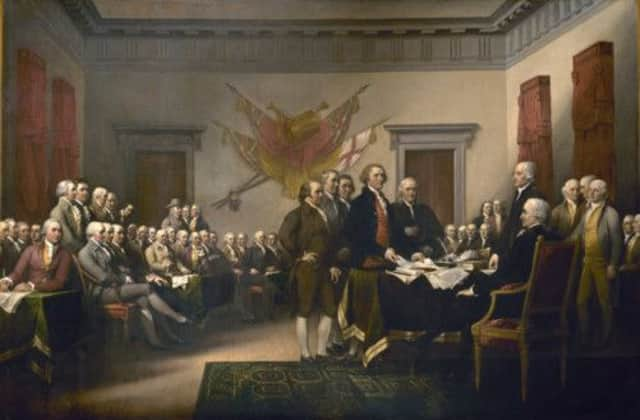Declaration of independence ‘wrong for Scots’


Nine of the 56 men who scrawled their names on the famous declaration in 1776 were from Scotland, including a respected Kirk minister from East Lothian and a farmer’s son from Fife.
Frustrated by London’s growing interference in local affairs, rising taxation and a centralisation of government, they rebelled against their own king to create the United States of America.
Advertisement
Hide AdAdvertisement
Hide AdAnd while similar arguments are now being deployed as a reason for Scottish independence, relatives of the US founding fathers say modern-day Scots should stick with Britain when it comes to the referendum vote next year.
Among the most prominent signatories in 1776 was John Knox Witherspoon, a Presbyterian minister who had left his home in Scotland eight years earlier to head up a college in Princeton.
His great-great-great-great grandson Jim Alexander, the registrar-general of the Descendants of the Signers of the Declaration of Independence Society (DSDI) that operates across the US, said: “I am proud to be part of a small, and very important, group of people related to the founding fathers who fought so hard for American independence, but I am not convinced Scotland should go the same way.
“I have visited Scotland a number of times and I’ve yet to meet people who can give me a definitive answer as to what would be gained from independence.
“Given the size of the economy, the size of the population and so on, surely Scotland already gets the best of both worlds with a parliament in London and a parliament in Edinburgh for different issues?”
Alexander, 71, from Portland, Oregon, added: “My ancestor John Witherspoon did not like the British – it was as simple as that.
“As far as next year’s referendum is concerned, he would have probably said that London should take a hike; that the English should get out of Scotland’s backyard.
“But things are different now and the idea of Scottish independence is something quite unsettling for many Americans, myself included.”
Advertisement
Hide AdAdvertisement
Hide AdThe DSDI Society currently has 1,000 members who can all prove their ancestors were one of the 56 founding fathers. Other prominent Scots who signed the Declaration included William Hooper, the son of another Scottish minister, James Wilson, a farmer’s son from St Andrews who went on to become a Supreme Court justice, and George Ross, whose nephew’s wife, Elizabeth “Betsy” Ross, became famous for making the first-ever American flag.
John Glynn, a retired US naval officer from Nashville, Tennessee, and the president-general of the DSDI, is also against Scotland separating from the UK. Lieutenant Commander Glynn, 68, who has links to two of the founding fathers and says he can trace his family line back to Robert the Bruce, said: “I guess freedom runs in my veins, and I love Scotland. But the business people I speak to say, ‘Why change?’ It’s a valid point.
“You also have to remember that Scotland isn’t exactly under the same pressures or the same difficulties that early America was facing in 1776.
“The Scots who came across here felt their way of life was being threatened by a London parliament that meddled in affairs, and felt obliged to fight for their freedom. It’s not exactly the same in 2013.”
Glynn added: “The way we see it in America, Scotland already has so much independence politically, so why take it further?”
Drafted by Thomas Jefferson – a man who would go on to become president – the US Declaration of Independence was adopted on 4 July, 1776, amid deteriorating relations between the 13 American colonies and Great Britain. It set forth grievances against King George III and announced the creation of a new state outwith London control.
Rev Witherspoon, born in Gifford, East Lothian, was a staunch Scottish nationalist who became involved in the independence movement upon arriving in America.
Of particular interest to him was the fact the British Crown gave the Episcopal Church more authority over colonial affairs, and he was appointed to the Continental Congress.
Advertisement
Hide AdAdvertisement
Hide AdIn response to claims America was not ready for independence, he is noted as saying: “It is not only ripe for the measure, but in danger of rotting for the want of it.”
The Kirk minister went on to serve on more than 100 government committees, shape early US foreign policy and help create the monetary system that became the dollar.
From among his students at the College of New Jersey in Princeton came 37 judges, 28 senators, 49 congressmen and the fourth US president, John Madison.